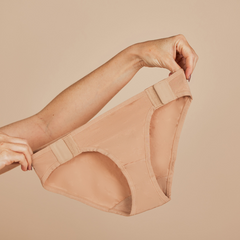Breast cancer surgery recovery tips can help you pre and post-op to handle the emotional and physical impact of your operation.
Whether you’re having surgery yourself, or supporting a loved one as they recover, there are a few tips you can try to alleviate some discomfort and help with some independence in the days, weeks and months after surgery.

Preparing For Your Surgery
Surgery is daunting for anyone, and there are a few ways you can prepare for the operation and the recovery period to try and alleviate some of your worries.
In most cases, you should assume that you will have limited mobility for at least the first couple of weeks. It’s important to prepare yourself mentally and practically for this scenario.
Here are a few key preparations before your surgery:
- Have easy-to-prepare or frozen meals, medications, and supplies like bandages or gauze in easily accessed places. You will likely want to minimise how much you move your arms during the initial recovery. Try to keep supplies on lower shelves and places where you won’t need to stretch or reach for them.
- Arrange pillows and blankets in a spot where you can relax and rest comfortably. Rest is really important after surgery so try to make this space as comfortable as possible.
- If mobility is an issue, consider rearranging furniture or setting up a temporary sleeping area on the main floor to avoid stairs. Similarly, try to make arrangements for other essentials like using the bathroom that will allow you to stay in an easy-to-navigate area.
- Make loved ones aware of your plans. Let those around you know about your surgery so that they can be prepared to help. You may want to give them a key or arrange support before or after the operation.
Lean On Your Support Network
It’s incredibly important to lean on your support network both before and after surgery. Whether it’s family, friends, support groups or even your medical team, it’s important to talk about how you’re feeling and access proper support during this period. Loved ones will be happy to help, so try to let them.
Try Adaptive Clothing and Aids
Clothing and assistance tools can simplify your healing process and prevent excessive strain after surgery. Loose or adaptive clothing, grabbers and even dressing tools can be really useful during the first few weeks of recovery.
Read more: What should women wear after surgery?
Breast Cancer Surgery Recovery Tips
With much of the preparation done before surgery, you can focus on recovery. What can you do during the recovery period to help with healing and try to prevent too much discomfort?
Pain management
As with any surgery, you’ll likely experience some degree of discomfort. Your doctor will prescribe pain medications or suggest over-the-counter options to help manage this pain initially. It’s important to take these as directed and to communicate with your healthcare team if the pain is not well-controlled or seems to be getting worse.
On top of prescribed medication, there are a few other tips you can try. Applying ice to the area can help reduce swelling and alleviate some pain. Make sure to wrap the ice pack in a cloth to protect your skin and be wary that skin tissue will likely be quite sensitive.
Get Enough Rest
In the days and weeks following surgery, it’s essential to listen to your body and avoid overexertion. Simple activities like walking can help promote circulation, but it’s important to avoid strenuous exercise or heavy lifting until your doctor gives you the green light.
Stay Active, But Don’t Overdo It
While rest is important, gentle movement is also key for recovery. Walking can be a really good way to promote circulation and prevent complications like blood clots.
As you heal, your doctor may recommend specific exercises to help restore the range of motion in your arms and shoulders. It’s important to carefully follow medical advice when it comes to stretching and exercise to avoid aggravating wounds.

Practice Good Wound Care
Proper wound care is essential for preventing infection during the recovery period. Follow your healthcare provider’s instructions on how to clean and dress your wounds.
If you notice signs of infection, such as increased redness, swelling, warmth, or discharge, contact your doctor immediately.
Wear the Right Post-Surgery Bras and Clothing
Wearing proper post-surgery clothing can make a huge difference to your comfort levels during recovery.
Adaptive clothing, clothing designed with special features to account for limited mobility, can be the key to achieving independence after surgery. In particular, those having breast cancer surgery may be interested in bras.
After surgery, many are advised to avoid wired bras and overstretching to fasten the bra. Reaching behind your back or excessive twisting can impact your wounds.
Adaptive bras, like Springrose bras, are designed to provide gentle support and minimize movement.
Look for features like:
- Front Closures: Soft Velcro fastens that attach under the cup minimize movement in the hands and shoulders.
- Soft, Breathable Fabrics: Soft fabrics will reduce irritation and be comfortable when you’re resting post-surgery.
- Adjustable Straps: Front adjusting fastens and shoulder straps allow for a customizable fit that accommodates changes in swelling.
Read more: Adaptive bras and how to wear a bra after surgery



